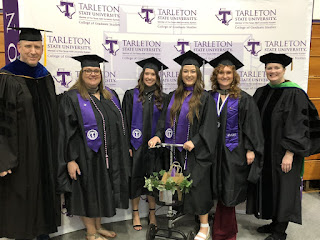Sarah Maben, Ph.D. | A communication prof focusing on teaching and learning,
social media, ethics, and public relations
Monday, December 13, 2021
Commencement 2021 - New MAs
Wednesday, September 29, 2021
Free Article: Stakeholder Expectations for Social Media Listening
Dr. Chris Gearhart and I merged our research interests to tackle what stakeholders expect in listening (and responding) in social media dialog. We found that higher active-empathic responses were rated as more competent and offer some ideas for social media managers.
Here's a link to free copies of our research. Enjoy!
https://www.tandfonline.com/eprint/PMVI4NAQXJRYRICJH8GK/full?target=10.1080/10904018.2019.1602046
Gearhart, C. C., & Maben, S. K. (2021). Active and empathic listening in social media: What do stakeholders really expect. International Journal of Listening, 35(3), 166-187. DOI: 10.1080/10904018.2019.1602046
Tuesday, August 10, 2021
Summer of...
When I think of summer progress, I first consider items marked off a to-do list and manuscripts shipped off for publication consideration. But progress is also the things we've learned along the way.
- This summer I dove into Nvivo with a friend's help. We are analyzing social media messages from a particular hashtag campaign. Being in the role of the learner is wonderful because we need reminders of what our students feel like when they start a new endeavor in our classes.
- I jumped into literature about academic mothering and life writing. We are told to find our research areas and not to stray too far, but there is something refreshing about striking out into a new area.
- I am reminded about how much I love to write and design. Writing makes me feel like myself and designing gives me a creative outlet. I tend to forget to cultivate these areas in the long semesters.
- I tried a new mantra...finish three main to-do list items. For me, it worked. I was able to disconnect at the end of my workday more easily than before.
While it's great to complete grant work and set lofty goals for the next academic year, taking a little time to reflect on what I've learned about myself is valuable as well.
With only a week left, what are you learning this summer?
Monday, March 15, 2021
Promote Yourself - PR Primer for Academics
News Flash - You are an expert. As an academic, you are an expert within your field. Building your research profile should include some publicity for yourself. It helps you, your department, and your university.
I know, you need one more thing to do. You're already researching and writing, just add a few tasks to the end of each project to-do list.
- Write a news release about your research in progress and when you land a publication or present. Send it to your university's media relations team. Even if it doesn't land a big TV news story, placement on the university news page helps your SEO. Need help? Look for a PR writing course on your campus. Students love real-world projects they can include in their portfolios.
- Adapt your research into a public-friendly blog post. Send it to your department, center for teaching excellence, research and innovation office, library, and university publicity office with no. 3. The publicity office will LOVE you for helping them do their work. They need content for their magazines, online newsletters, and social media outlets! Our library likes to create displays of faculty research. It's nice when they don't have to hunt down what they need.
- Make it visual. Anyone can use Canva.com or a free infographic builder. The hard part of boiling down your work down.
- Take pictures at conferences. Aim for the highest resolution you can, and action shots would be even better. Images and graphics are helpful to your university marketing team when they are trying to put together a publication or a gray web page.
- Share your research synopsis and graphic on your own social accounts. If you don't like tooting your own horn, thank your grantor and laud your student-writers and co-authors for their work.
- Update your university web page (and all of your academic accounts like ResearchGate, etc.) and add areas of expertise as needed to your web bios.
Now, every university is different. See what is acceptable at yours and ask senior researchers about these ideas and your local points of contact.
You say, "But, I don't want to look like an arrogant snot." I hear that, but picture this. The university PR team is staring at a list of hundreds of faculty members. They have no idea what everyone is doing. They can't. That's a lot of hunting and individual contacts to build. You can help them by bringing content to them.

